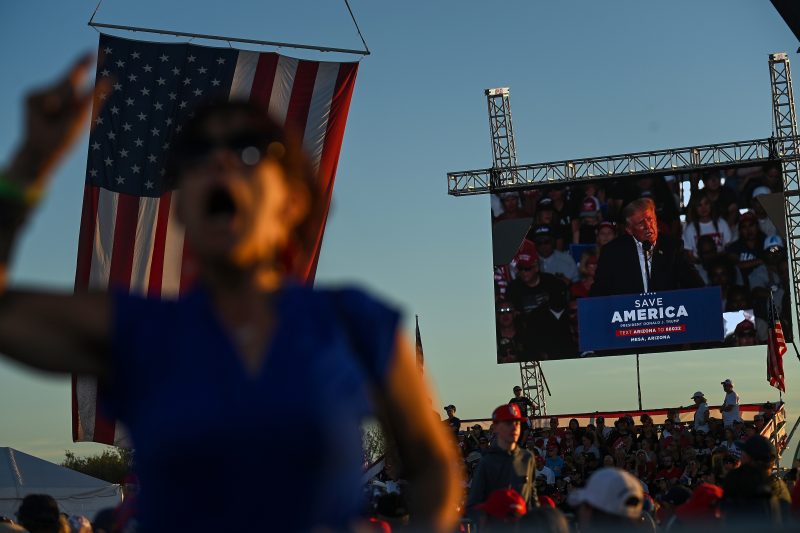This article has been updated to include former president Donald Trump’s additional social-media posts.
Donald Trump’s history of suggestive allusions to endorsing violence by his supporters is well chronicled. But rarely have his comments been this unvarnished at such a fraught time.
With his potential indictment looming in Manhattan, the former president on Thursday criticized those who have called for his supporters to remain peaceful.
“EVERYBODY KNOWS I’M 100% INNOCENT, INCLUDING BRAGG,” Trump said on Truth Social, referring to Manhattan District Attorney Alvin Bragg. “BUT HE DOESN’T CARE. HE IS JUST CARRYING OUT THE PLANS OF THE RADICAL LEFT LUNATICS. OUR COUNTRY IS BEING DESTROYED, AS THEY TELL US TO BE PEACEFUL!”
Trump later Thursday posted an article featuring a picture of himself with a baseball bat next to a picture of Bragg. And early Friday morning, he explicitly mentioned the prospect of violence: He questioned why Bragg would charge him while knowing “that potential death & destruction in such a false charge could be catastrophic for our Country.”
While not explicitly urging his supporters to get violent, the seeming message here is that a peaceful response might be insufficient and he is warning of the unrest that his supporters could unleash if he’s charged. To label it a dog whistle would be an understatement. Trump is standing next to a tinderbox and casually lighting a match.
Truth Social is the social media site Trump launched after being banned from Twitter following the Jan. 6, 2021, riot. A late 2022 study found that only 2 percent of Americans use it, but its users were disproportionately right-leaning, and Trump’s messages on it are often amplified elsewhere. In a little over two hours Thursday, Trump’s post was shared more than 4,000 times and liked more than 14,000 times.
And as always with Trump’s veiled allusions to political violence, the context is important.
Over the weekend, Trump stirred consternation by urging a “PROTEST” over his arrest, which he wrongly wagered would happen Tuesday. Even that clearly worried his Republican allies, given what became of the last major Trump-spurred protest, on Jan. 6. House Speaker Kevin McCarthy (R-Calif.) and even Rep. Marjorie Taylor Greene (R-Ga.) urged people not to protest. Others said something Trump conspicuously hadn’t, which was that the protests should be peaceful.
Even while urging people not to protest, though, Greene argued that it was implied that Trump was talking about peaceful protest.
“He doesn’t have to say peaceful for it to mean peaceful. Of course, he means peaceful,” Greene told reporters. “Of course, President Trump means peaceful protests.”
Just days later, Trump has already undermined that. Trump not only hasn’t backed off his call for protest or clarified that he wants peace; he’s now pointedly criticizing those who would urge such demonstrations to be peaceful in the face of such an alleged injustice.
Trump in recent days also questioned why his supporters in the New York City Police Department would protect “THE RADICAL LEFT” as it seeks to prosecute him — resharing the post voicing that complaint on Thursday.
The comments also come after Trump, despite the lessons of Jan. 6, has continued to promote the idea that his supporters might take up arms on his behalf — including as recently as last month.
As I wrote then:
The timing is also key. While Trump’s Jan. 6 speech at one point urged people to “peacefully and patriotically” protest, the buildup to that day was again littered with suggestive language. Trump lawyer Rudy Giuliani in his own speech that day endorsed the idea of “trial by combat,” and weeks before, Trump promoted the Jan. 6 protest by saying, “Be there, will be wild!” Even as some had predicted the possibility of violence, Trump directed his supporters to march to the U.S. Capitol.
In the years before came a series of allusions to violence, much like the one we saw Thursday. Rather than explicitly endorse violence, Trump would often merely point to the possibility that his supporters might resort to it or would even be forced to do so.
A telling example from 2019: “I have the support of the police, the support of the military, the support of the Bikers for Trump — I have the tough people, but they don’t play it tough until they go to a certain point, and then it would be very bad, very bad.” (It was the second time Trump said something to this effect.)
At the time, former Trump lawyer Michael Cohen was warning about the possibility that Trump, if he were defeated in 2020, would try to stay in office. Some wagered that sounded ridiculous. But as I wrote then:
Jan. 6 showed how much those seeds flourished. Many Jan. 6 defendants who stormed the Capitol said they believed they were acting upon Trump’s wishes.
And today despite it all — or perhaps because of it — Trump is still giving his supporters license to believe that violence might be the answer.








